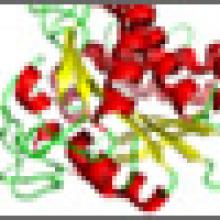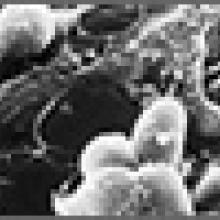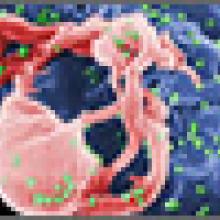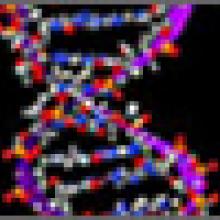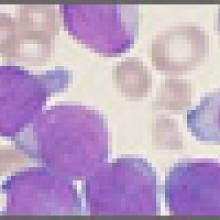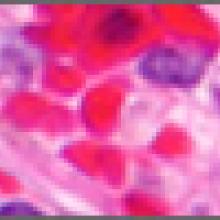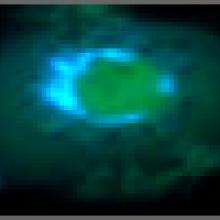Newsroom
Cancer spread (metastasis) is responsible for about 90% of cancer deaths so knowing which cancers are likely to spread is very important. Researchers in China, Canada and the U.S. have discovered that levels of a single protein allowed them to make predictions of cancer spread with 90%… more
Japanese researchers have confirmed that dogs are able to very accurately detect colon cancer, even at early stages. The researchers let the dogs sniff stool or breath samples of cancer patients, normal patients and individuals with non-cancerous conditions of the colon (i.e. diverticulitis… more
Having surgery is stressful and it is well known that high stress levels can negatively affect the immune system. Researchers at MD Anderson have shown that patients taught stress management can boost their immune system function. The patients were all men who were going to have… more
Normal, healthy cells use specific proteins called transcription factors to regulate the activit of their genes. Importantly this is done in a tightly controlled manner. When the transcription factor NF-κB is functioning normally, it is capable of being turned off and on, and thus cellular… more
There's a reason your mom was so insistent you eat your broccoli. Among other things, broccoli has repeatedly shown its potential to fight off the development of cancer. This effect is accomplished, at least in part, by the enzyme myrosinase and the anti-inflammatory effects of a chemical found in… more
Broccoli is a special vegetable. Besides being packed with vitamins, it has repeatedly shown a capacity to fight off cancer. Until recently, why broccoli had this effect remained unknown. A recent study in the American Cancer Society's Journal of Medicinal Chemistry reveals that isothiocyanates (… more
The development of a model of the breast ductal system on a microchip represents a major step forward in breast cancer research. The “ breast-on-a-chip” model allows researchers to more accurately see the interaction that breast cancer therapies have with their environment, and how these affect… more
Human Immunodeficiency Virus (HIV) causes severe repression of the body’s capacity to heal and fight off infection. As a result, HIV patients are at a greater risk for developing some cancers. For HIV positive patient, physicians must pay special attention to their cancer treatment, since… more
Most cancer deaths, about 90%, are caused by cancer that has metastasized, or spread throughout the body. Blocking this step is a key goal of many cancer therapies. For this reason, researchers at the University of East Anglia were excited to report the discovery of a gene that appears directly… more
Hepatitis B (HBV) and hepatitis C (HCV) are both viral diseases that cause inflammation of the liver. Of the 40 million HIV patients in the world, approximately 6-9 million are also carriers of one of the chronic hepatitis viruses. Since the development of highly active antiretroviral therapy (… more
The enzyme Rad18, with the help of the Cdc7 protein, directs DNA repair machinery to sites of DNA damage. DNA repair is important in healthy cells but this repair can interfere with certain forms of cancer treatment. If cellular DNA is severely damaged, the cell will often die instead of… more
B-cell acute lymphocytic leukemia is an aggressive condition where the body over-produces B-cells. A study recently published in Blood has linked this condition, which primarily affects children, with an overabundance of the Fmn2 gene and protein. The sooner abnormal cell activity is detected, the… more
The IDH1 gene is directly involved in a cells' ability to metabolize food. It is also the most commonly mutated metabolic gene in human cancer cells. Scientists at the UNC Lineberger Comprehensive Cancer Center have now uncovered how this mutation changes the body's chemistry and supports the… more
The Kaposi's Sarcoma Virus been linked with several different types of cancer. The mechanisms that cause cancer to form after infection are still being discovered. A recently published article in the journal Science reveals a new piece of the puzzle. Once the Kaposi's sarcoma virus invades a… more
Macrophages are naturally occurring cells of the immune system, but different types of macrophages have different activities in the presence of cancer cells and the results are not always so good. M1 macrophages work to fight off cancer growth by activating immune cells that target the malignant… more
Viruses have become one of the more surprising combatants against cancer. Although people often think of viruses as agents that make them sick, researchers have been developing viruses that attack cancer cells and spare healthy cells. These viruses are called oncolytic viruses, and the specificity… more
In a recent latest news article, CancerQuest presented research describing the anxiey patients often suffer when presented with a false-positive reading of a mammography. Much of this stress is due to the fact that the patients must then undergo additional screenings, which often include biopsies… more
Cigarette smoking has been linked to at least 18 different types of cancer. Some of the worst cancer-causing agents are called polycyclic aromatic hydrocarbons (PAH). These chemicals bind to DNA, causing mutations that can lead to cancer.
In the first study of its kind, researchers… more
Measles is not typically thought of in positive ways. Even with the availability of a vaccine against the virus, over 100,000 people die from measles infections each year. Researchers at the University of Texas and the Mayo Clinic have shown how proteins on the surface of the… more
Early detection is key in the treatment of cancer, thus it is recommended that women begin having yearly mammograms starting at age 40. It is important to know, however, that a mammography is not a formal diagnosis. There may be false-positives, in which an abnormal mammogram does not, in fact,… more

